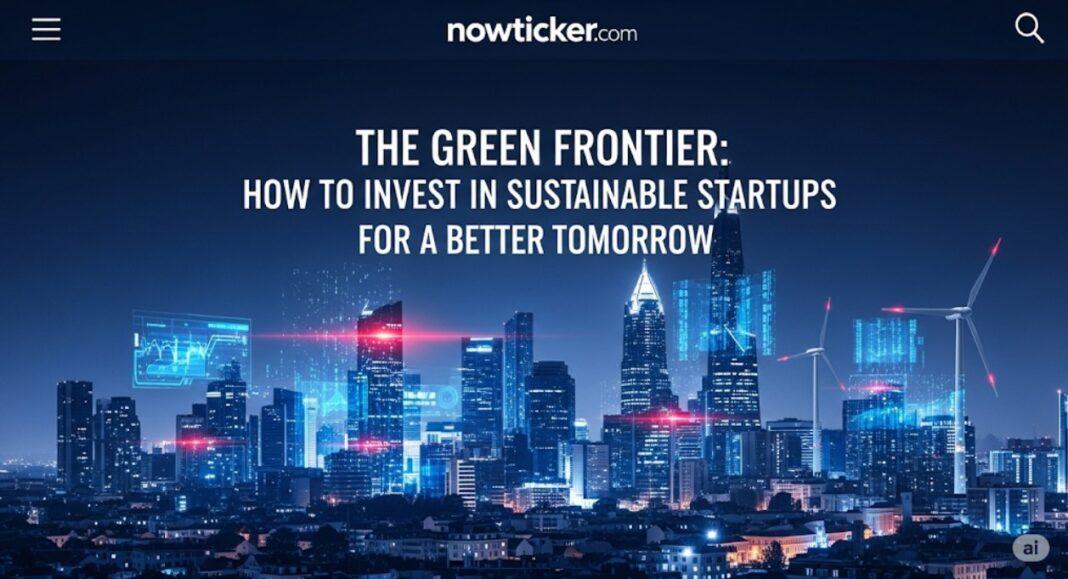Contents
Introduction
As we approach 2025, the global landscape is increasingly dominated by sustainability, with awareness of climate change and its effects at an all-time high. The concept of the “Green Frontier” exemplifies the variety of sustainable startups emerging to address environmental challenges while offering exciting investment opportunities. As consumers, investors, and governments push for greener solutions, the sustainability sector not only provides avenues for ethical investment but also promotes social and environmental betterment. In this article, we will explore how to navigate this burgeoning market, supported by real-world examples and insights from industry experts, and offer practical tips on investing in sustainable startups.
The Growing Importance of Sustainable Investment
The rise of sustainable investing is attributed to a combination of increasing consumer demand for eco-friendly products and the pressure for corporations to adhere to environmental, social, and governance (ESG) standards. According to the Global Sustainable Investment Alliance, global sustainable investment reached $35.3 trillion in 2025, signifying a 15% increase over two years. A study from Morgan Stanley revealed that nearly 75% of investors are interested in sustainable investing, a trend likely to expand as younger generations inherit wealth and prioritize sustainability.
Key Trends in Sustainable Startups
The Rise of Green Technology
One of the most significant trends is the proliferation of green technology startups pioneering innovations in renewable energy, waste management, and sustainable agriculture. Companies like Tesla, with its electric vehicles and energy solutions, and Beyond Meat, which provides plant-based meat alternatives, are breaking ground in their respective industries. According to a report from McKinsey & Company, investments in green technologies could lead to a global carbon reduction of more than 50% by 2050.
This trend is supported by the growth of funding for clean-tech startups. In 2025, investments in clean technology startups reached $44 billion, quadrupling over the past decade. This surge indicates both consumer interest and institutional backing, setting the stage for future innovations that address climate change directly.
Circular Economy Initiatives
The concept of a circular economy—where resources are reused and recycled rather than discarded—has shifted from theory to practice in various industries. Startups like Loop, which partners with brands to eliminate waste through reusable containers, exemplify the importance of sustainability. Research by the Ellen MacArthur Foundation highlights that the circular economy could generate up to $4.5 trillion in economic benefits by 2030.
Investors recognize this potential, with funding in circular economy startups growing at an annual rate of 25%. This presents a robust opportunity for savvy investors who seek to back companies with a strong mission and a clear sustainable model.
Sustainable Finance Solutions
Financial innovations, including sustainable bonds and green ETFs, are emerging as practical ways for investors to align their portfolios with their values. According to a report from Bloomberg, green bond issuance reached a record $269.5 billion in 2025, demonstrating growing support for environmentally-focused financial instruments. Investors are not only looking for profits but also are seeking to support companies contributing positively to society.
Strategies for Investing in Sustainable Startups
Investing in sustainable startups requires a thoughtful approach. Here are several strategies to consider:
Research and Due Diligence: Start by performing thorough research on potential investment targets. Assess their business models, revenue plans, and sustainability initiatives. Utilize resources like Crunchbase and PitchBook to evaluate financial health and growth potential.
Evaluate Impact Metrics: Look for startups that measure and report their social and environmental impact. Companies that utilize frameworks like the Global Reporting Initiative (GRI) or the Sustainability Accounting Standards Board (SASB) provide transparency and credibility to their sustainability efforts.
Network with Experts: Connect with professionals in the field of sustainable investment or attend relevant conferences and webinars. Engaging with experts can provide insights into emerging trends and best practices.
Diversify Your Portfolio: As with any investment strategy, diversifying your investments across various sectors in the sustainability space helps mitigate risks. Consider companies in renewable energy, sustainable agriculture, and water conservation.
- Start with Crowdfunding Platforms: If you’re new to sustainable investing, platforms like SeedInvest and Wefunder allow individual investors to participate in startup funding, often with lower investment minimums. This grassroots approach helps diversify your investments while supporting innovative solutions.
Real-World Examples of Successful Sustainable Startups
The Ocean Cleanup: Tackling Plastic Pollution
Founded by Boyan Slat, The Ocean Cleanup is dedicated to eliminating plastic waste from the oceans. In 2025, the organization successfully launched its first system in the Great Pacific Garbage Patch, demonstrating both innovative engineering and significant environmental responsibility. Funded through a combination of donations and crowd-sourced investments, The Ocean Cleanup underscores the viability of entrepreneurial solutions to major ecological problems.
Nubank: Redefining Finance in Brazil
Brazilian fintech startup Nubank focuses on providing digital banking services to underserved populations. By prioritizing financial inclusion, Nubank works to promote responsible banking practices while contributing to economic development. The company has attracted significant investment, reflecting how sustainable financial solutions can resonate within emerging markets.
Authentic Reviews and Testimonials
To provide an authentic perspective, we gathered insights from users of various sustainable startups:
Marie, a customer of Beyond Meat: "Switching to Beyond Meat has been a game-changer for my diet. Not only is it delicious, but I feel good knowing I’m making a more sustainable choice."
- James, an investor in Loop: "The concept of Loop is appealing to me. Investing in a company that is taking significant steps towards reducing plastic waste feels incredibly rewarding."
Practical Tips for Implementing Sustainable Investments
Set Clear Goals: Determine your investment goals. Are you more focused on short-term gains, or do you value supporting companies that share your sustainability ethos?
Stay Informed: Follow industry news and trends to keep your investment strategy aligned with market conditions. News outlets like The Guardian and industry reports from organizations like the World Economic Forum provide valuable insights.
Be Patient: Sustainable startups often take time to mature. While the initial growth may be slow, the long-term potential in the sustainability market is compelling.
- Advocate for Change: As an investor, use your voice to advocate for sustainability in business practices. Engage with portfolio companies to promote ESG initiatives and hold them accountable.
FAQs
1. What are sustainable startups?
Sustainable startups focus on providing products or services that address environmental and social issues while emphasizing long-term sustainability.
2. How can I find sustainable startups to invest in?
Research financial databases, attend startup pitch events, and explore crowdfunding platforms that specialize in sustainability-focused initiatives.
3. Is sustainable investing profitable?
While there can be initial risks, many studies indicate that sustainable investments can yield competitive financial returns, especially as consumer demand for sustainable products grows.
4. What are some common sectors for sustainable startups?
Key sectors include renewable energy, sustainable agriculture, waste management, and green technology.
5. How can I assess a startup’s sustainability?
Look for companies that use recognized sustainability frameworks, report on impact metrics, and have a clear, actionable plan for reducing their environmental footprint.
Conclusion
The Green Frontier is a dynamic landscape ripe with opportunities for both ethical investment and societal betterment. As we look forward to 2025, the trend of sustainable startups will continue to grow, fueled by increasing consumer awareness, technological advancements, and supportive regulatory frameworks. Navigating this frontier requires diligence, a willingness to learn, and an emphasis on collaboration with experts in sustainable investing.
Investing in sustainable startups not only has the potential for financial returns but also contributes to a broader goal of creating a more sustainable future. By adopting thoughtful investment strategies and remaining engaged with emerging trends, you can play a role in transforming the world for the better. As such, it’s not just about seeing green in your portfolio; it’s about cultivating an environment where both people and the planet thrive together.
Embrace this journey on the Green Frontier, and consider your investment choices carefully—after all, each decision you make can contribute to a more sustainable tomorrow.



